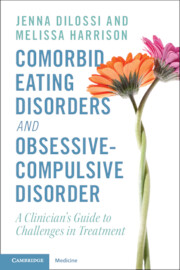 Comorbid Eating Disorders and Obsessive-Compulsive Disorder
Comorbid Eating Disorders and Obsessive-Compulsive Disorder Book contents
- Comorbid Eating Disorders and Obsessive-Compulsive Disorder
- Comorbid Eating Disorders and Obsessive-Compulsive Disorder
- Copyright page
- Contents
- Foreword
- Preface
- Acknowledgments
- Abbreviations
- Part I Overview of the Existing Literature
- Part II Clinical Pitfalls and Treatment Failures
- Part III Evidence-Informed Considerations for Assessment and Treatment
- Chapter 14 Thorough Assessment
- Chapter 15 Collaborative Conceptualization and Treatment Planning
- Chapter 16 Navigating Meal Planning
- Chapter 17 Navigating Self-Monitoring
- Chapter 18 Navigating the Scale & weighing
- Chapter 19 Navigating Body Image
- Part IV Special Topics and Future Considerations
- References
- Index
Chapter 17 - Navigating Self-Monitoring
from Part III - Evidence-Informed Considerations for Assessment and Treatment
Published online by Cambridge University Press: 14 December 2023
- Comorbid Eating Disorders and Obsessive-Compulsive Disorder
- Comorbid Eating Disorders and Obsessive-Compulsive Disorder
- Copyright page
- Contents
- Foreword
- Preface
- Acknowledgments
- Abbreviations
- Part I Overview of the Existing Literature
- Part II Clinical Pitfalls and Treatment Failures
- Part III Evidence-Informed Considerations for Assessment and Treatment
- Chapter 14 Thorough Assessment
- Chapter 15 Collaborative Conceptualization and Treatment Planning
- Chapter 16 Navigating Meal Planning
- Chapter 17 Navigating Self-Monitoring
- Chapter 18 Navigating the Scale & weighing
- Chapter 19 Navigating Body Image
- Part IV Special Topics and Future Considerations
- References
- Index
Summary
Self-monitoring is a core component of cognitive behavioral therapy (CBT) and is often used in the treatment of eating disorders (EDs) and obsessive-compulsive disorder (OCD). It enables individuals to observe their behaviors and thought patterns, identify triggers and areas of strength, and make changes to improve their mental and physical health. For individuals with co-occurring OCD and EDs, self-monitoring can be especially useful in discerning between their thoughts and those influenced by their pathology. However, there is a risk that self-monitoring can become compulsive and part of the OCD. In people with OCD, the process of information gathering can fuel the disorder and lead to prolonged distress, rigidity, and a lack of mindfulness. To address this, a therapist may suggest modifying the self-monitoring protocol or incorporating OCD-specific treatment such as exposure and response prevention (ERP) into the treatment plan. It’s important for individuals to seek professional help and support to address their co-occurring OCD and ED. Clinicians treating EDs should be aware of the signs that OCD may be impacting the self-monitoring process and take steps to address it.
- Type
- Chapter
- Information
- Comorbid Eating Disorders and Obsessive-Compulsive DisorderA Clinician's Guide to Challenges in Treatment, pp. 116 - 119Publisher: Cambridge University PressPrint publication year: 2023
